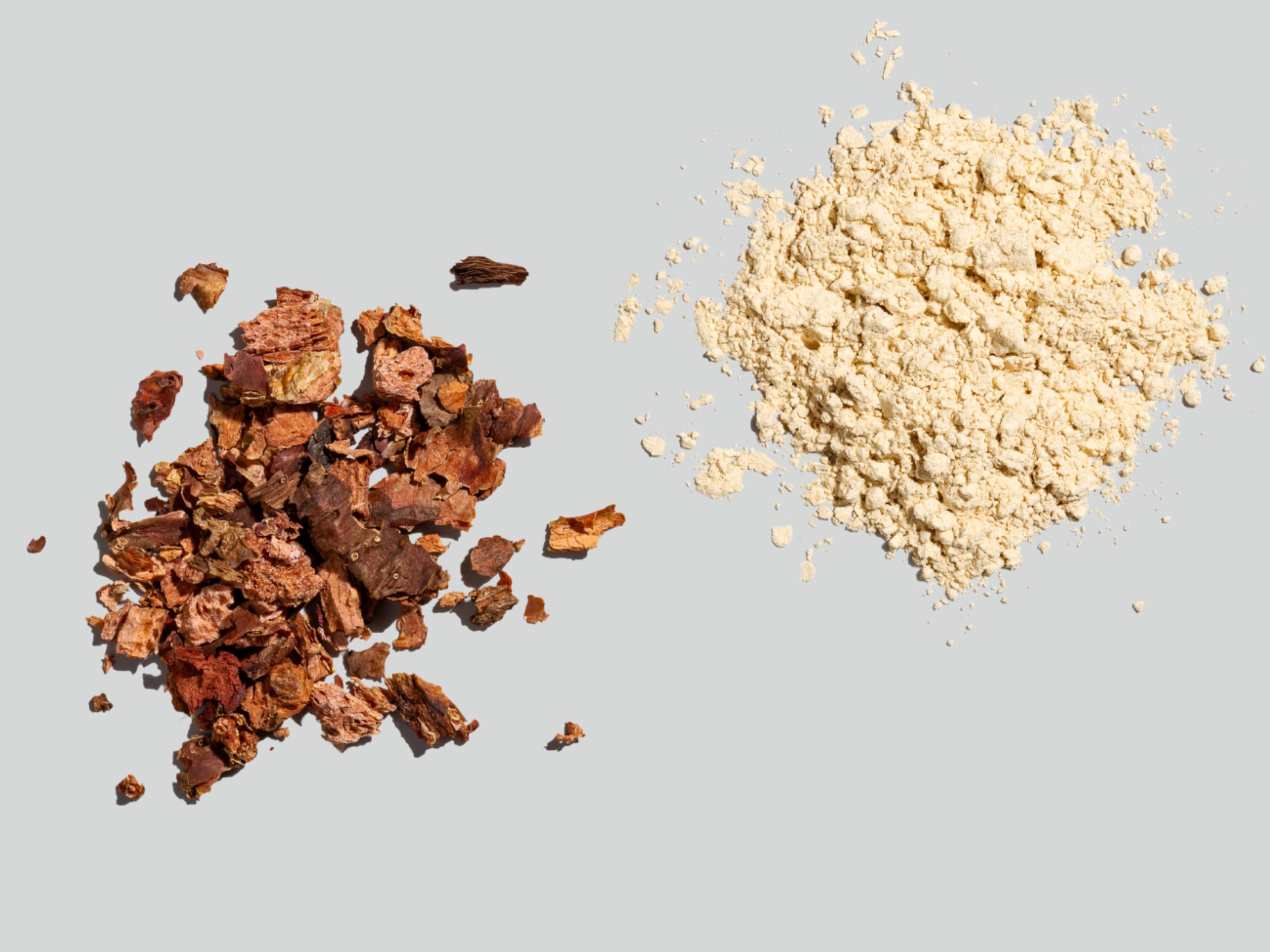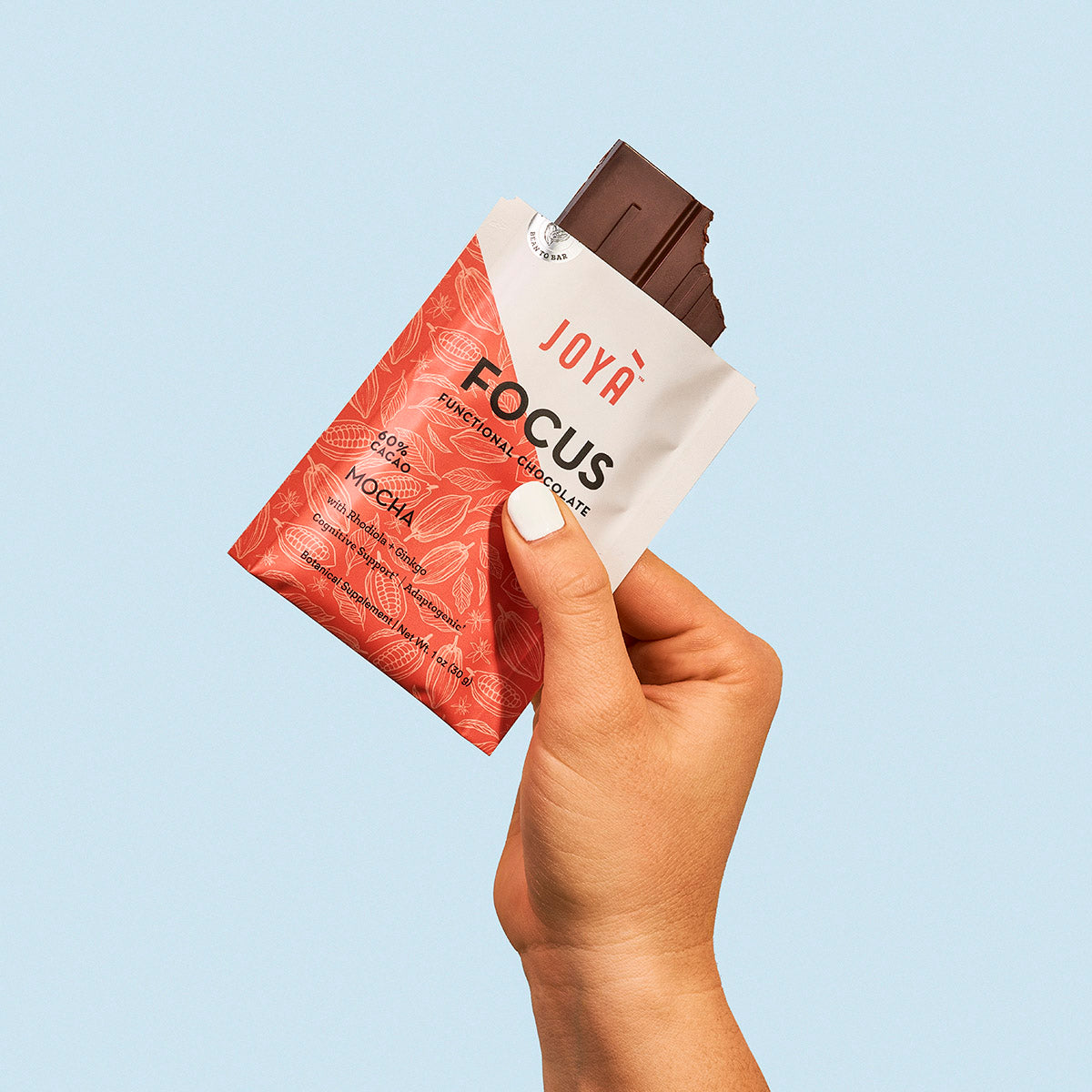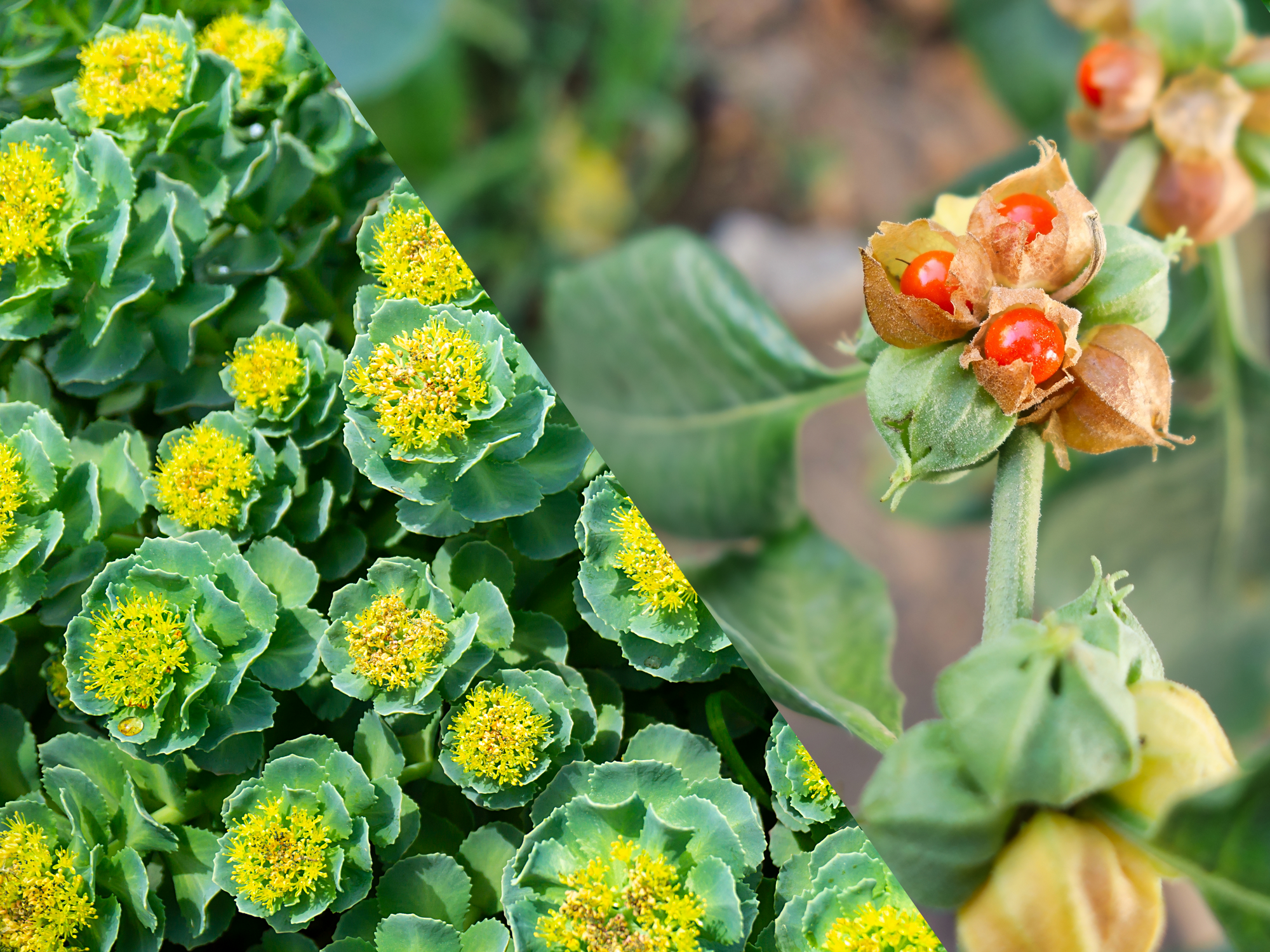
Once you start your journey into herbal wellness, you’ll find it can sometimes be hard to choose between certain herbs. It can be overwhelming to learn about them and determine which ones are right for you and when they’re right for you.
That’s okay — the team at JOYÀ is a little herb-obsessed. We’re here to share our passion and give you the information you need to make informed decisions about your herbal supplementation.
Two adaptogenic herbs we love are rhodiola and ashwagandha. While they’re both powerful, they’re actually quite different in how they can affect the body. These two herbs are like the yin to each other’s yang. Follow along as we dive into the wonderful world of adaptogens!

What Is Rhodiola?
Rhodiola is an adaptogenic flowering herb that grows in high altitudes in Europe and Asia. It loves cold weather and is also known as king’s crown, roseroot, or arctic root. The root of this plant has been used as a traditional medicine in countries including Russia and China to help support energy levels and cognitive function, and it also has a high antioxidant content.
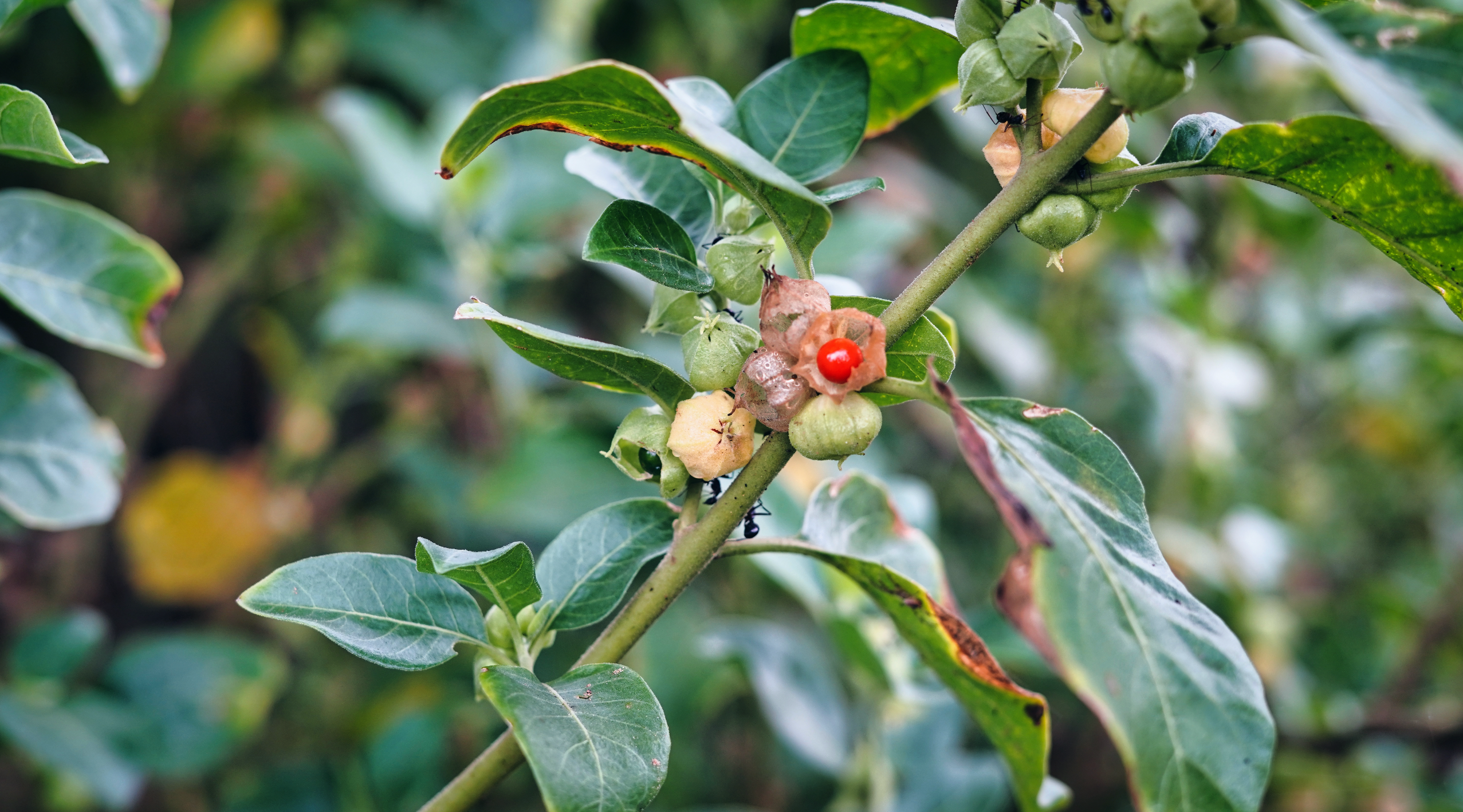
What Is Ashwagandha?
This little evergreen shrub is found primarily in India and North Africa. Like rhodiola, it’s an adaptogenic herb that has been trusted for millennia as one of the most prized herbs in the traditional Indian system of medicine, Ayurveda.
Ashwagandha extract can be sourced from both the aerial parts (fruit and leaves) and root of the plant. At JOYÀ, we use ashwagandha root because it has been more widely studied for its health effects, and it’s the part that has been used medicinally for thousands of years.
What Are Adaptogens?
Adaptogens are a group of herbs and fungi that help the body adapt to stress and help restore and maintain balance in the body. One of the key ways that adaptogens accomplish this is by helping to balance our hormonal and nervous systems.
While adaptogens aren’t new — these herbs have been used for thousands of years in traditional medicines such as Ayurveda and Traditional Chinese Medicine — they are new to many of us in the West.
One amazing, unique property of adaptogenic herbs like rhodiola and ashwagandha is that they meet you where you are, “adapting” to your needs and helping to recalibrate your body’s systems so they function properly, irrespective of whether they are overactive or under-active.
Rhodiola vs. Ashwagandha: How Are They Different?
Both rhodiola and ashwagandha are adaptogens that help the body restore balance, but they work in different ways. Let’s look specifically at how they interact with the nervous system to get a better understanding of how you’d want to use them.
Stimulating vs. Relaxing
If you haven’t guessed, one of these herbs is calming, ideal for promoting balance in an over-stimulated body, while the other is stimulating, ideal for promoting sustainable energy in a depleted body.
Rhodiola – a stimulating adaptogen – can help provide mental clarity and increased focus both in the short term and over long periods of use. But don’t confuse this herb with chemical stimulants like caffeine that our body can become dependent on. Rhodiola promotes deep, natural energy by supporting the energy of our cells. It has an exciting effect on the brain, which can help you finish a report or meet a deadline without relying on cup after cup of coffee.
Meanwhile, when our body is overstimulated, ashwagandha – a calming adaptogen – can help aid in relaxation and reduce physical and emotional stress. Studies have shown that it can also help protect the nervous system and support healthy brain function, enhancing memory and helping your brain repackage and store information.
Building Energy vs. Balancing Energy
Both adaptogens play a vital role in supporting your energy, but there are some crucial differences in how they work. While ashwagandha – and all adaptogens for that matter – help to relieve fatigue by nourishing the nervous system and supporting balanced stress hormone levels, rhodiola can also help enhance energy.
Even ancient warriors, like the Vikings, were thought to use rhodiola to help give them increased stamina during war and help keep them focused during battle.
One of the most unique benefits of this powerful adaptogen is the way in which it can make the body more resilient. When you are feeling particularly worn thin, rhodiola can help enhance your body’s natural energy by encouraging our cell’s mitochondria to make adenosine triphosphate (ATP), which is what our cells use for energy.
While rhodiola can contribute to your energy resources when you’re feeling depleted, ashwagandha can help manage your energy stores by supporting your adrenal glands when you're feeling overworked and even irritable. Think of it like your energy accountant. By supporting your nervous system and lowering cortisol levels, ashwagandha can help your body conserve energy and redirect it to where it actually needs to go.
What Are the Similarities?
Even though rhodiola and ashwagandha have different effects on your nervous system, they have a few similarities that are worth noting.
Antioxidants
Both herbs have antioxidant properties, which can help protect your body against free radical damage (also called oxidative stress). Free radicals are produced in the body by normal metabolic processes, as well as when you come into contact with external stressors like ultraviolet light, pollution, or cigarette smoke, and can contribute to various metabolic diseases and age-related syndromes.
Cognitive support
Rhodiola and ashwagandha are also both brain-loving herbs. With the ability to support the nervous system and modulate cognitive function, they can support better focus and memory.
Immune support
Our busy, stressful daily routines can take a toll on our immune function, as chronic stress suppresses our immune system’s ability to do its job. Rhodiola and ashwagandha help fight immune depletion to help keep our immune system functioning properly.

Is Rhodiola or Ashwagandha Better for Focus?
If both adaptogens support cognitive function, which is better for focus? The answer isn’t as simple as naming one or the other, as research suggests that these herbs work in similar, but also different ways.
Stress can be damaging to our nervous system. As rhodiola and ashwagandha are antioxidant-rich herbs, they can help protect the central nervous system from damage that causes deterioration in brain function. And as adaptogens, both herbs can support memory and cognition by increasing our body’s resistance to physical and emotional stress.
But each of these herbs also have some unique brain-loving superpowers that can provide more immediate effects.
For instance, rhodiola is great for enhancing focus. Thanks to its ability to boost mental energy, rhodiola has been shown to improve neuro-motor performance and support concentration and short-term memory.
Imagine that you’re at the end of a long meeting and still have four hours left in the workday. You need stamina and focus to help power you through. This is where it helps to have rhodiola on hand. You can get the focus you need quickly and without the accompanying jitters or nervousness you might experience if you consume too much caffeine (we’ve been there, done that).
Similarly, ashwagandha can support immediate (and general) memory, sustained attention, and information-processing speed. As a calming adaptogen, it can also help support focus when you’re feeling overwhelmed by lowering your stress levels to reduce stress-induced brain fog.
Ready to get adaptogenic? Let’s talk about how to add these herbs to your daily lineup. Hint: it’s both easy and delicious with JOYÀ.
How Can You Use Rhodiola and Ashwagandha?
You’ve probably figured out that you’d want to use rhodiola when you want a more immediate burst of focus and energy, and ashwagandha when you want to calm your nervous system and support deep, long-lasting energy.
The great news is that you can find both of these adaptogens in JOYÀ products.
Accessing Ashwagandha
You can find ashwagandha in a big box store, but you might not be able to tell with any real certainty whether it’s an effective dose, how pure the ingredients are, or whether or not they’ve been sustainably sourced. At JOYÀ, our products are expertly formulated with powerful, concentrated extracts, and we source all of our organic and wildcrafted ingredients sustainably. We also third-party test our products to verify purity and safety so that you can be confident about what you consume.
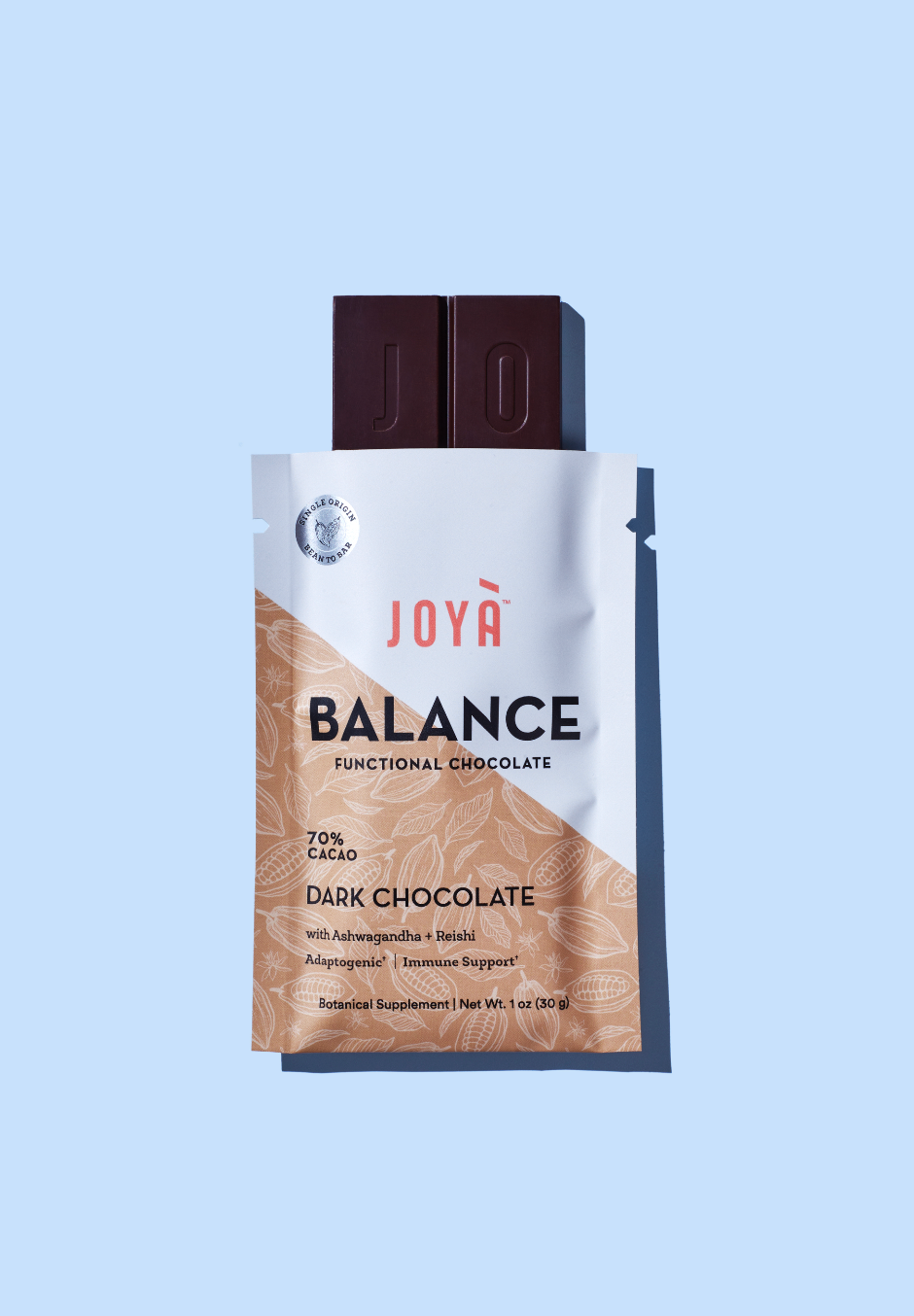
Prefer a solid chunk of chocolate goodness to a supplement powder or tincture? We’ve got you covered. You can find ashwagandha hanging out in our Balance Functional Chocolate. One bar can help restore balance and reset your day.
Re-inventing Rhodiola
Rhodiola is naturally bitter – those are the medicinal compounds you’re tasting. The ancient Vikings who used it for stamina on the battlefield didn’t have a choice in the matter, but you do. We seamlessly blended rhodiola into our Focus Functional Chocolate bar. This way, you can get all the focus, immune support, and energy, without the bitter taste.
Can You Take Them Together?
While rhodiola and ashwagandha are both powerful herbs for supporting physical and mental energy levels and reducing feelings of stress, we don’t recommend combining them. Each is best suited to support the body in different states.
If you’re feeling depleted and need a boost of energy, stimulating rhodiola is your ideal choice. But if you’re feeling wound up and can’t turn off your mind, and perhaps that’s impacting your sleep, calming ashwagandha has got your back.
When Should You Use Each?
For best results, take rhodiola and ashwagandha at different times during your day. Because ashwagandha is more relaxing, you’ll benefit most from taking it in the evening as you prepare for bed, or anytime if you’re having a particularly stressful day. On the other hand, since rhodiola has a stimulating effect, it’s better to use it earlier in the day to avoid disrupting your sleep schedule.
The Bottom Line
You’re one step closer to unpacking the benefits of traditional herbal medicine and learning how nature provides solutions for your wellness. With a little help from rhodiola and ashwagandha, you can fight stress, support your cognitive function, enjoy clear focus, and even amp up your energy levels.
It all starts at JOYÀ, where we’re making it easy to access the traditional adaptogens you want in chef-crafted products you’ll crave.

